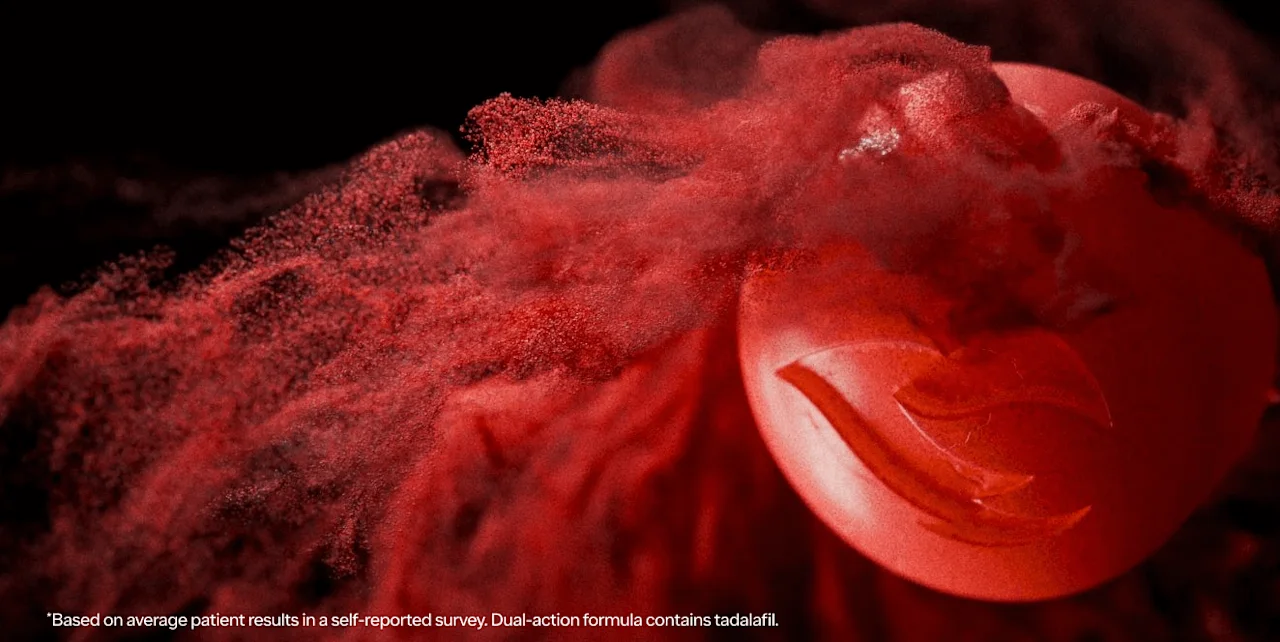Key takeaways
Penile sensitivity changes are often linked to blood flow issues, nerve compression (like from cycling or lots of sitting), certain medications, low testosterone, or stress and anxiety.
Some people regain or see an increase in penis sensitivity after adjusting medications, treating low testosterone when appropriate, or using prescription erectile dysfunction medications to support blood flow.
Easing up on rough or frequent masturbation, eating well, exercising to boost circulation, avoiding prolonged pressure on the groin, and other lifestyle changes can support better sensation.
Here's what we'll cover
Here's what we'll cover
Here's what we'll cover
Key takeaways
Penile sensitivity changes are often linked to blood flow issues, nerve compression (like from cycling or lots of sitting), certain medications, low testosterone, or stress and anxiety.
Some people regain or see an increase in penis sensitivity after adjusting medications, treating low testosterone when appropriate, or using prescription erectile dysfunction medications to support blood flow.
Easing up on rough or frequent masturbation, eating well, exercising to boost circulation, avoiding prolonged pressure on the groin, and other lifestyle changes can support better sensation.
Penile sensitivity — your ability to feel touch, pressure, and pleasure down there — is key to sexual enjoyment. But when your sensation decreases, the experience can change. The good news: If you’re trying to figure out how to increase penis sensitivity, there are practical, effective ways to help get sensation back.
What causes penile sensitivity?
Penile sensitivity is often caused by:
Changes in blood flow to the penis
Changes in nerve function to the penis
Hormones
Medications
Mental-health factors, such as stress and anxiety
Feeling in the penis depends on healthy nerves and good circulation. If either one isn’t working well, sensations can fade.
Nerves can get irritated or compressed from things like long bike rides, lots of sitting, or repeated pressure on the groin. Blood-flow problems can also dull sensation by limiting how strongly penile tissue responds to touch.
Hormones and medications can also play a role in penile sensitivity (or lack thereof). Low testosterone, for example, can reduce libido and make stimulation feel less intense. Some antidepressants and other drugs affect brain chemicals involved in arousal, which can blunt sensation.
Mental health matters, too. Stress, anxiety, and depression can disrupt the brain–body connection that makes touch feel pleasurable.
9 ways to increase penile sensitivity
If you’re trying to increase penis sensitivity, the goal is simple: improve blood flow, protect nerve function, and reduce anything that dulls your physical or mental response to touch.
These practical, science-backed steps can help you get started.
1. Try prescription ED medications
Medications such as sildenafil (Viagra) and tadalafil (Cialis) increase blood flow to the penis, which can make erections feel firmer and physical sensation stronger during arousal.
For many people, better circulation alone supports stronger erections and a more responsive sexual experience overall.
These medications are available by prescription for those who have ED and can be discussed with a healthcare provider online, such as through Ro, or in person.
2. Use lube
Dry friction can make touch feel uncomfortable or dull instead of pleasurable. Using a good-quality lubricant can reduce irritation and allow nerve endings to respond more naturally to pressure and movement.
Lube can improve sensitivity during solo play as well as sex, especially if you’ve noticed soreness or numbness after longer sessions.
Just be sure to choose a water- or silicone-based lube without unnecessary additives (like artificial flavors) that could cause irritation.
3. Change up sex positions
Some positions can create more direct stimulation than others. So, if sensation has dropped down there, give a new position (or two) a go. Switching positions can help you find angles that increase pressure or friction where you feel it most.
Positions that allow deeper contact or your partner to control pacing can sometimes heighten awareness and increase sensation.
4. Switch masturbation technique
Rough grips or very tight pressure during masturbation can train your nerves to respond only to intense stimulation. Over time, your penis can become less sensitive, and partnered sex (or even a lighter-touch solo session) can feel less stimulating by comparison. This phenomenon is known as “death grip syndrome.”
Research suggests that switching up your masturbation habits could help restore sensitivity in your penis. For instance, you could try:
Using a lighter grip
Slowing your pace
Adding lube
Focusing more on full-shaft and tip stimulation rather than squeezing tightly at one spot
5. Consider switching medications
Some medications — especially antidepressants and certain neurological drugs like anticonvulsants — can dull sexual sensation.
If you think medication could be playing a role, don’t stop taking it on your own. Talk to your healthcare provider about whether there are alternative options, adjusting your dose, or adding treatments that offset sexual side effects.
6. Check your testosterone levels
Low testosterone can lower sex drive and blunt how intense pleasure feels. It can also cause fatigue, mood changes, and muscle loss.
If you’ve noticed any of these symptoms along with reduced penile sensitivity, tell your healthcare provider. They can order a blood test to check your hormone levels and determine the best treatment option (if necessary) for you.
If low testosterone is confirmed, testosterone replacement therapy (TRT) may help improve desire and overall sexual response. But remember, a healthcare provider should always guide treatment.
7. Take care of your mental health
Mental health conditions like depression can affect the brain–body connection that makes touch feel pleasurable. So even when nerves and blood flow are healthy, mental overload can make stimulation feel flat or disconnected.
Support options include:
Therapy or counseling
Stress-reduction practices like exercise or mindfulness
Medications, when appropriate
8. Use the right bike seat
If you bike regularly, your saddle could be part of the problem. Traditional bike seats can put prolonged pressure on the nerves and blood vessels that supply the penis, which may reduce sensation over time.
Research shows that switching to a “no-nose” or pressure-relieving bike seat can significantly reduce genital numbness by decreasing compression on the pelvic nerves and improving blood flow.
Also helpful for increasing penile sensitivity? Taking breaks during long rides and adjusting seat height and angle.
9. Improve daily blood flow habits
Good circulation supports healthy nerve function and stronger sensation. Simple lifestyle changes make a difference, including:
Exercising regularly
Limiting alcohol
Eating a heart-healthy diet
Avoiding prolonged sitting or heavy pressure on the groin
Reduced penis sensitivity vs. penis numbness
Reduced penile sensitivity and penis numbness can feel similar, but they aren’t quite the same. Understanding the difference can help you take the best next steps.
Reduced penis sensitivity means you can still feel touch, pressure, and temperature, but everything feels muted or less intense than it used to.
Sex might still be pleasurable, just not as satisfying.
Orgasms may take longer or feel weaker.
This is often linked to blood-flow changes, overstimulation from masturbation habits, medications, hormone shifts, or stress and anxiety.
Penis numbness, on the other hand, usually means you have little to no feeling at all in part of — or the entire — penis.
You might notice tingling, “pins and needles,” burning, or a cold sensation.
Some people also see color changes in the skin, such as bluish or purplish tones.
Numbness is more often tied to nerve compression or damage, like long cycling sessions, pelvic injury or surgery, or medical conditions that affect the nerves. In fact, 50%–80% of cyclists report some amount of genital numbness (most often a loss of sensation in the penis), depending on how much time they spend cycling.
Here’s a simple way to think about it:
If touch still feels normal but less enjoyable, you’re likely dealing with reduced sensitivity.
If touch barely registers — or doesn’t register at all — you may be dealing with numbness.
Because numbness can be a sign of nerve or health problems, it shouldn’t be ignored. If you’re experiencing true loss of sensation — not just reduced sensitivity — it’s a good idea to check in with a healthcare provider.
How to treat penis numbness
If you’re dealing with true numbness, treatment focuses on healing irritated nerves, improving blood flow, or addressing medical issues behind penis sensitivity.
Here are treatment options to consider:
Reduce pelvic pressure. Limiting pressure on the groin allows compressed nerves to recover. This means taking breaks from long periods of sitting, standing up and walking regularly, wearing loose-fitting clothing and underwear, and using cushions or ergonomic chairs. If you bike, switching to a “no-nose” saddle can help reduce pressure linked to genital numbness.
Try pelvic floor physical therapy. A pelvic floor physical therapist can teach gentle stretches and exercises that relax tight muscles around the pelvis and relieve nerve irritation. Over time, this can improve nerve signaling and restore sensation.
Review your medications. Some prescriptions can contribute to numbness or dampened sexual sensation. Talk with your healthcare provider about whether adjustments, alternative medications, or dose changes might help. Never stop or change medications on your own.
Test hormones and blood sugar. Blood tests can check for low testosterone or conditions like diabetes that affect nerve and blood-vessel health. Treating these underlying issues can support nerve healing and help sensation return.
Address circulation with lifestyle changes. Regularly exercising, quitting smoking, limiting alcohol, and eating a heart-healthy diet can improve blood flow and nerve repair. These changes won’t work overnight, but they can play a big role in long-term recovery.
Consider medical or specialty treatments. When numbness doesn’t improve with conservative steps, a specialist may recommend advanced options such as nerve-block injections. These treatments are reserved for specific cases and require careful medical assessment.
Are there natural ways to increase penis sensitivity?
Yes, many people can see improvement with simple, natural changes that support nerve health, blood flow, and overall sexual responsiveness. These approaches won’t create overnight results, but they can make a real difference over time.
Exercise regularly. Cardio and strength training improve circulation throughout the body, including the penis. Better blood flow means stronger erectile response and more nerve stimulation during sex. Even brisk daily walking can help.
Eat a heart-healthy diet. Foods that support blood-vessel health also support sexual function. Focus on leafy greens, berries, whole grains, nuts, fish, lean proteins, and healthy fats. Reducing ultra-processed foods and excess sugar helps protect nerves and circulation.
Quit smoking and limit alcohol. Smoking damages blood vessels and nerves, both of which are critical for sensation. Alcohol can dull nerve signaling and interfere with arousal, especially in larger amounts. Cutting back — or quitting completely — can improve sexual sensation over time.
Reduce overstimulation during masturbation. If you use a very tight grip or stimulate aggressively, your nerves can become less responsive to normal touch. Switching to gentler pressure, slowing down, using lube, and varying technique can help restore natural sensitivity.
Protect your pelvic nerves. Avoid long periods of sitting without breaks, wear comfortable clothing that doesn’t compress the groin, and use proper padding or ergonomic seating. Cyclists should consider stress-reducing bike seats that limit pressure on the pelvic nerves.
Get good sleep and manage stress. Poor sleep and stress can interfere with hormone balance and nervous-system function. Aim for consistent rest (at least 7–9 hours each night), and consider relaxation techniques like mindfulness, breathing exercises, or yoga to support sexual wellbeing.
What to keep in mind if your partner is affected by poor penis sensitivity
Watching a partner struggle with reduced penile sensitivity can feel confusing, frustrating, or even personal. But it’s important to remember this is a physical and emotional health issue, not a lack of attraction or desire.
Here are practical ways to support your partner and keep intimacy strong:
Talk openly and without pressure. Communication creates safety and trust. Let your partner know you’re on their team and that pleasure doesn’t have to revolve around “performance.” Avoid blaming language or assuming what they’re feeling — just stay curious and supportive.
Expand your definition of intimacy. Pleasure and connection aren’t limited to penetration. Oral sex, hands, toys, massage, slow touching, and full-body foreplay can be deeply satisfying while decreasing pressure around erections or sensation. Many couples find intimacy actually improves when they explore non-penetrative options.
Experiment together. Trying new positions, lube, pacing, cock rings, or stimulation styles can help uncover what brings the most sensation and connection. Treat this as a shared exploration rather than a problem to “solve.”
Encourage medical support when needed. If your partner feels hesitant about seeing a provider, gentle encouragement can help normalize getting support. You can offer to attend appointments, help research options, or simply listen.
Bottom line
Changes in penile sensitivity are common, and in many cases they’re treatable. The key is figuring out what’s behind the change and taking steps — medical, lifestyle, or both — to support nerve health, blood flow, and overall sexual well-being.
Reduced sensitivity is often linked to blood-flow issues, nerve pressure, medications, hormones, or stress.
Many people see improvement with prescription ED medications, adjusting masturbation habits, changing medications when needed, or treating low testosterone.
True numbness usually points to nerve compression or irritation and may benefit from reducing pelvic pressure, pelvic floor therapy, or specialist care.
Natural habits matter: Regular exercise, a heart-healthy diet, blood sugar control, quitting smoking, limiting alcohol, good sleep, and stress management all support sensation.
Open communication and partner support can reduce pressure and keep intimacy strong while recovery happens.
Frequently asked questions (FAQs)
Can the P-shot enhance penile sensitivity?
Early research suggests the P-Shot (platelet-rich plasma injection) may help improve erections in some people, especially those who don’t respond to ED medications. But there currently isn’t strong evidence that it reliably boosts penile sensitivity, in particular.
The P-Shot injects components of your own blood into the penis. It’s promoted as a way to support tissue repair and nerve signaling. Because the science is still limited, however, it’s considered experimental and it’s unclear whether it can truly enhance penile sensitivity. More research is needed.
DISCLAIMER
If you have any medical questions or concerns, please talk to your healthcare provider. The articles on Health Guide are underpinned by peer-reviewed research and information drawn from medical societies and governmental agencies. However, they are not a substitute for professional medical advice, diagnosis, or treatment.
Viagra Important Safety Information: Read more about serious warnings and safety info.
Cialis Important Safety Information: Read more about serious warnings and safety info.
References
Anastasiadis, E., Ahmed, R., Khoja, A. K., & Yap, T. (2022). Erectile dysfunction: Is platelet-rich plasma the new frontier for treatment in patients with erectile dysfunction? A review of the existing evidence. Frontiers in Reproductive Health, 4, 944765. doi:10.3389/frph.2022.944765. Retrieved from https://pmc.ncbi.nlm.nih.gov/articles/PMC9580815/
Aoun, F., Alkassis, M., Tayeh, G. A., Chebel, J. A., Semaan, A., Sarkis, J., Mansour, R., Mjaess, G., Albisinni, S., Absil, F., Bollens, R., & Roumeguère, T. (2021). Sexual dysfunction due to pudendal neuralgia: a systematic review. Translational Andrology and Urology, 10(6), 2500–2511. doi:10.21037/tau-21-13. Retrieved from https://pmc.ncbi.nlm.nih.gov/articles/PMC8261452/
Baradaran, N., Awad, M., Gaither, T., Fergus, K., Ndoye, M., & Cedars, B., et al. (2018). The association of bicycle-related genital numbness and Sexual Health Inventory for Men (SHIM) score: results from a large, multinational, cross-sectional study. BJU International, 124(2), 336-341. doi: 10.1111/bju.14396. Retrieved from https://bjui-journals.onlinelibrary.wiley.com/doi/10.1111/bju.14396
Bauer, S. R., Breyer, B. N., Stampfer, M. J., Rimm, E. B., Giovannucci, E. L., & Kenfield, S. A. (2020). Association of Diet With Erectile Dysfunction Among Men in the Health Professionals Follow-up Study. JAMA Network Open, 3(11), e2021701. doi:10.1001/jamanetworkopen.2020.21701. Retrieved from https://pmc.ncbi.nlm.nih.gov/articles/PMC7666422/
Behn, M., Kielhofner, J., Panicker, J. N., & Kaplan, T. B. (2024). Sexual dysfunction and commonly used drugs in neurology. Practical Neurology, 24(3), 207–214. doi:10.1136/pn-2023-003760. Retrieved from https://pubmed.ncbi.nlm.nih.gov/38212111/
Bowling, J., Blekfeld-Sztraky, D., Simmons, M., Dodge, B., Sundarraman, V., Lakshmi, B., Dharuman, S. D., & Herbenick, D. (2020). Definitions of sex and intimacy among gender and sexual minoritised groups in urban India. Culture, Health & Sexuality, 22(5), 520–534. doi:10.1080/13691058.2019.1614670. Retrieved from https://pubmed.ncbi.nlm.nih.gov/31144604/
Corona, G., & Maggi, M. (2022). The role of testosterone in male sexual function. Reviews in Endocrine & Metabolic Disorders, 23(6), 1159–1172. doi:10.1007/s11154-022-09748-3. Retrieved from https://pmc.ncbi.nlm.nih.gov/articles/PMC9789013/
Ghanavatian, S., Leslie, S. W. & Derian, A. (2024). Pudendal Nerve Block. StatPearls. Retrieved from https://www.ncbi.nlm.nih.gov/sites/books/NBK551518/
Ghantous, I., Tlais, M., Khatib, A., Ghantous, G., Sahyoun, M., Hteit, A., Tarchichi, A., Maroun, G., Jaber, N., & Challita, A. (2025). Impact of Obesity, Smoking, and Alcohol on Erectile Dysfunction: A Cross-Sectional Study of Lebanese Men. Cureus, 17(11), e95891. doi:10.7759/cureus.95891. Retrieved from https://pmc.ncbi.nlm.nih.gov/articles/PMC12667219/
Gül, M., Şahin, A., Doğan, Ç., Çeker, G., Altıntaş, E., Deliktaş, H., Demir, M., Yavuz, A., Altunkol, A., Değer, D., Kaynar, M., Duran, B., Toprak, T., Bahçeci, T., & Gül, Ü. (2025). Exploring the impact of sexual positions on ejaculation: Insights from a survey study by the Andrology Working Group of the Society of Urological Surgery in Turkey. Andrology, 13(6), 1490–1500. doi:10.1111/andr.13775. Retrieved from https://pmc.ncbi.nlm.nih.gov/articles/PMC12368932/
Hu, D., Zhang, Y., Zhang, Y., Liu, Y., & Han, J. (2024). The relationship between social support and erectile dysfunction in middle-aged and older males. Frontiers in Public Health, 12, 1332561. doi:10.3389/fpubh.2024.1332561. Retrieved from https://pmc.ncbi.nlm.nih.gov/articles/PMC11112009/
Jenkins, L. C., & Mulhall, J. P. (2015). Delayed orgasm and anorgasmia. Fertility and Sterility, 104(5), 1082–1088. doi:10.1016/j.fertnstert.2015.09.029. Retrieved from https://pmc.ncbi.nlm.nih.gov/articles/PMC4816679/
Kaur, J., Leslie, S. W. & Singh, P. (2024). Pudendal Nerve Entrapment Syndrome. StatPearls. Retrieved from https://www.ncbi.nlm.nih.gov/books/NBK544272/
Kennedy, C. E., Yeh, P. T., Li, J., Gonsalves, L., & Narasimhan, M. (2021). Lubricants for the promotion of sexual health and well-being: a systematic review. Sexual and Reproductive Health Matters, 29(3), 2044198. doi:10.1080/26410397.2022.2044198. Retrieved from https://pmc.ncbi.nlm.nih.gov/articles/PMC8942543/
Leslie, S. W. & Sooriyamoorthy, T. (2024). Erectile Dysfunction. StatPearls. Retrieved from https://www.ncbi.nlm.nih.gov/books/NBK562253/
Litwinowicz, K., Choroszy, M., & Wróbel, A. (2021). Strategies for Reducing the Impact of Cycling on the Perineum in Healthy Males: Systematic Review and Meta-analysis. Sports Medicine (Auckland, N.Z.), 51(2), 275–287. doi:10.1007/s40279-020-01363-z. Retrieved from https://pmc.ncbi.nlm.nih.gov/articles/PMC7846539/
Mielacher, C., Scheele, D., Kiebs, M., Schmitt, L., Dellert, T., Philipsen, A., Lamm, C., & Hurlemann, R. (2024). Altered reward network responses to social touch in major depression. Psychological Medicine, 54(2), 308–316. doi:10.1017/S0033291723001617. Retrieved from https://pubmed.ncbi.nlm.nih.gov/37272345/
Musicki, B., Bella, A. J., Bivalacqua, T. J., Davies, K. P., DiSanto, M. E., Gonzalez-Cadavid, N. F., Hannan, J. L., Kim, N. N., Podlasek, C. A., Wingard, C. J., & Burnett, A. L. (2015). Basic Science Evidence for the Link Between Erectile Dysfunction and Cardiometabolic Dysfunction. The Journal of Sexual Medicine, 12(12), 2233–2255. doi:10.1111/jsm.13069. Retrieved from https://pmc.ncbi.nlm.nih.gov/articles/PMC4854187/
Panchatsharam, P., Durland, J. & Zito, P. (2023). Physiology, Erection. StatPearls. Retrieved from https://www.ncbi.nlm.nih.gov/books/NBK513278/
Perelman M. A. (2016). Psychosexual therapy for delayed ejaculation based on the Sexual Tipping Point model. Translational Andrology and Urology, 5(4), 563–575. doi:10.21037/tau.2016.07.05. Retrieved from https://pmc.ncbi.nlm.nih.gov/articles/PMC5001992/
Sizar, O., Leslie, S. W. & Pico, J. (2023). Androgen Replacement. StatPearls. Retrieved from https://www.ncbi.nlm.nih.gov/books/NBK534853/
Vasan, S. S., Pandey, S., Rao, S. T. S., Gupte, D. M., Gangavaram, R. R., Saxena, A., Kovil, R., Joshi, P., Goel, R., Mittal, S. K., Neogi, R., Joseph, S. P., Shah, D., & Khan, Z. (2025). Association of Sexual Health and Mental Health in Erectile Dysfunction: Expert Opinion From the Indian Context. Cureus, 17(1), e77851. doi:10.7759/cureus.77851. Retrieved from https://pmc.ncbi.nlm.nih.gov/articles/PMC11845324/
Zeiss, R., Malejko, K., Connemann, B., Gahr, M., Durner, V., & Graf, H. (2024). Sexual Dysfunction Induced by Antidepressants-A Pharmacovigilance Study Using Data from VigiBaseTM. Pharmaceuticals (Basel, Switzerland), 17(7), 826. doi:10.3390/ph17070826. Retrieved from https://pmc.ncbi.nlm.nih.gov/articles/PMC11279909/
Zhang, F., Xiong, Y., Qin, F., & Yuan, J. (2022). Short Sleep Duration and Erectile Dysfunction: A Review of the Literature. Nature and Science of Sleep, 14, 1945–1961. doi:10.2147/NSS.S375571. Retrieved from https://pmc.ncbi.nlm.nih.gov/articles/PMC9621223/













